In Yorgos Lanthimos’s previous film, Kinetta, an amateur film crew converges at a resort hotel in the off season to reenact accident and crime scenes, blurring the bounds between reality and staging in their obsessive attention to detail and complete immersion in their inscrutable project. In a sense, Dogtooth proves to be an extension of these themes of isolation, psychological ambiguity, and constructed reality. Each day, after their father (Christos Stergioglou) drives away from the gates of their secluded house in the suburbs, the older daughter (Aggeliki Papoulia), younger daughter (Anna Kalaitzidou), and son (Hristos Passalis) follow a strict regimen of tape-recorded (creative) vocabulary lessons (one that oddly assigns new definitions to everyday words), prescribed meals, and physical activities under the watchful eye of their mother (Michelle Valley). As in Kinetta, their motives remain unclear, and only the performance of the absurd ritual betrays their anxiety and longing. During the Q&A for the film, Lanthimos indicated that his initial idea was a science fiction in which families were being outlawed, and the lengths that people would go to in order to keep their own family intact. Intriguingly, the temporally indeterminate setting – represented by rotary dial telephones, cassette recorders, and VCRs – not only alludes to the film’s conceptual origin, but also reinforces the children’s hermetic existence that, like the obsolete household gadgets, is equally carefully preserving and repressively stunting.
© Acquarello 2010. All rights reserved.
